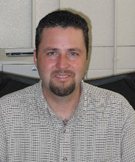News
Hernandez wins new grant to study lexical processing in children
Brandon Moeller
bmoeller@uh.edu
713-743-3668
May 18, 2009

Professor Arturo Hernandez - whose work at UH focuses on language processing of bilingual speakers - won a National Institutes of Health exploratory grant titled "Neural correlates of lexical processing in child (second language) learners."
"The grant is designed to investigate how brain activity changes in children who are learning a second language," Hernandez said. "We will investigate how expertise in a second language and the age at which this learning commences affects brain activity in children between the ages of 8-12."
The two-year $375,000 grant with a possible third-year extension is sponsored by the Eunice Kennedy Shriver National Institute of Child Health and Human Development's Child Development and Behavior Branch. The grant will allow Hernandez's Laboratory for the Neural Bases of Bilingualism to expand its research and recruit more bilingual children to participate in its studies.
"This grant will provide us with funds to recruit separate groups of children, ages 8, 10, and 12," Hernandez said. "By looking at groups of children at these different ages we can begin to look at how the brain changes as bilingual children get older."
To date, there are no published studies using brain imaging techniques with young children, Hernandez said. His research addresses the need for better understanding of how the human brain adapts to two languages.
"This population is of great societal importance because of the great number of bilingual children that are currently entering the school systems," Hernandez said. "Bilingual children's brain activity is incredibly sensitive to the amount and type of language exposure. The most interesting part of this is that unlike adults, children show much more flexibility in the language that has been used in the last few months or years. This flexibility can lead them to become better at their second language in a relatively short period of time."
The grant enables the Laboratory for the Neural Bases of Bilingualism to tap into the resources of a vast metropolitan area and its results could improve information and policy for educators serving a growing segment of the population.
"UH and the Houston metropolitan area represent one of the most linguistically diverse regions in the United States," Hernandez said. "It is one of the ideal places for me to carry out this research. I also hope that our results help to inform parents, educators and adults who may be working with children that are learning two languages."
NICHD conducts and supports research on all stages of human development, from preconception to adulthood, to better understand the health of children, adults, families and communities.
See a list of all the NICHD grant winners.
Return to News page